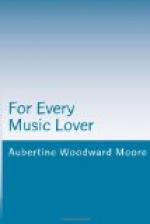An epoch-making event in opera history was the opening, in 1637, of the first public opera house in commercial Venice whose wealth afforded her citizens leisure to cultivate art. Soon popular demand led to the erection of many Italian opera-houses. At the same time growing taste for magnificence of stage setting and brilliant, dazzling, even extravagant song effects, caused neglect of Academician principles. The learned and gifted Neapolitan composer, Alessandro Scarlatti, father of the famous harpsichordist, gave an impulse in his operas, during the last quarter of the century, to sensuous charm and beauty of melody. He invested recitative with classic value, enlarged the aria, and devised the da capo which became a menace to dramatic truth.
In France, the troubadours had borne melody into the domain of sentiment, and laid a solid foundation for musical growth. Adam de la Halle’s pastoral, “Robin et Marion,” was an actual prototype of the opera. During the seventeenth century Corneille and Moliere refined the dramatic taste of their compatriots. Attempts to introduce Italian opera only resulted in arousing a desire for an opera in accord with French ideals.
This was gratified by Jean Battiste Lully, who had come to the French court from Italy in boyhood, and had risen, in 1672, from a subordinate position to that of chief musician. Undertaking to make reforms, he succeeded in giving his adopted country a national opera. He established the overture, gave recitative rhetorical force, added coloring to the orchestra, and introduced the ballet. New life was infused into the traditions he left when Jean Philippe Rameau, in 1733, at fifty years of age, wrote his first opera. He was well-known as a theorist and composer, and was the author of a harmony treatise in which were set forth the laws of chord inversions and derivations, a stroke of genius that hopelessly entangled him in perplexities. His instrumentation was more highly colored, his rhythms more varied than those of his predecessor, and his sincerity of purpose more evident. In common with other reformers he was accused of “sacrificing the pleasures of the ear to vain harmonic speculations.” Some of his many operas were written to works of Racine. He died in 1764, in his eighty-first year.
A century earlier the English reached the culmination of their Golden Age of musical productiveness in Henry Purcell, known as the most original genius England has produced. His dramatic powers were fostered by the popular masques with their gorgeous show of color and rhythm, and in mere boyhood he wrote music for several of them. In 1677, when only nineteen, he produced his first opera. He attempted no reform, but his instinct for the true relation between the accents of speech and those of melody and recitative seems to have been unerring. Saturated with native English melody, tingling with fertile fancy and controlled by education, whether he wrote for stage, church, or chamber, he evinced a freshness and vigor, a breezy picturesqueness and a wealth of rhythmic phrases and patterns, and many new orchestral devices. In 1710, fifteen years after his early death, the giant Handel began to dominate musical England, flooding the stage with operas of the Italian type and finally ushering in the reign of the oratorio. The delicate plant of English opera never took root.




